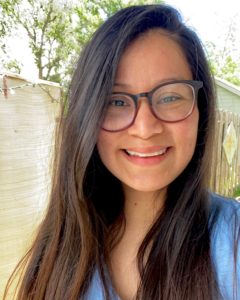
Liliana Gallegos, a fourth-year graduate student in the Department of Chemistry at Colorado State University, is at the forefront of an emerging research area – data chemistry. For this research, she has received the Frontera Computational Science Fellowship.
Gallegos is focusing on researching ways to use computer models to predict the outcomes of organic chemistry reactions in the hope of making them more efficient.
The fellowship is highly competitive and normally offers five fellowships each year. Gallegos’ award is even more unique because only four fellowships have been awarded for the 2021-2022 academic year.
Through the fellowship, Gallegos will receive a $34,000 stipend and $12,000 of tuition assistance, the opportunity to connect with and receive guidance from other researchers and industry professionals, as well as access to the Frontera Computing resources.
“This fellowship also allows me to compute my research on the most powerful academic supercomputer in the world,” she said.
Improving Efficiency in Chemistry
Gallegos spent around a year looking into the fellowship, which gave her time to come up with and propose a new way to approach the challenges in researching reaction optimization.
In her research, Gallegos applies quantum mechanical modeling to the molecules in a chemical reaction in order to understand the most likely reaction process to form the desired products, along with statistical modeling of the reaction.
Gallegos said that facing daily challenges of maximizing yields and ratio of desired products in synthetic organic chemical reactions “has inspired my graduate research work to develop tools that increase efficiency in the laboratory.”
This current research path came as a bit of a surprise to Gallegos. Previously, Gallegos’ research was all synthetic chemistry performed in a lab, and she had no coding experience prior to her introduction to her current research.
“During a rotation in Dr. Robert Paton’s group, I was able to experience a new aspect of organic chemistry through the realm of quantum mechanics and machine learning to understand complex reactions,” Gallegos said.
Gallegos will continue her research with Dr. Paton’s research group.
“I have the excellent opportunity to work alongside computer science, physical, and organic chemistry colleagues through Dr. Paton’s group at CSU,” Gallegos said.
The access to this range of research has helped Gallegos expand her own research interests, as well as provided her the opportunity to become a member of the Center for Computer-Assisted Synthesis.
Gallegos’ hope is that her current research improves the optimization process of challenging organic reactions. In addition to furthering her research, she hopes to keep learning and mentoring graduate students through a postdoctoral position.
Gallegos plans on visiting Frontera at the Texas Advanced Computing Center in Austin, Texas once travel restrictions loosen. In the meantime, she will continue to learn and research at CSU.
“I love organic chemistry, and I love what I do!”